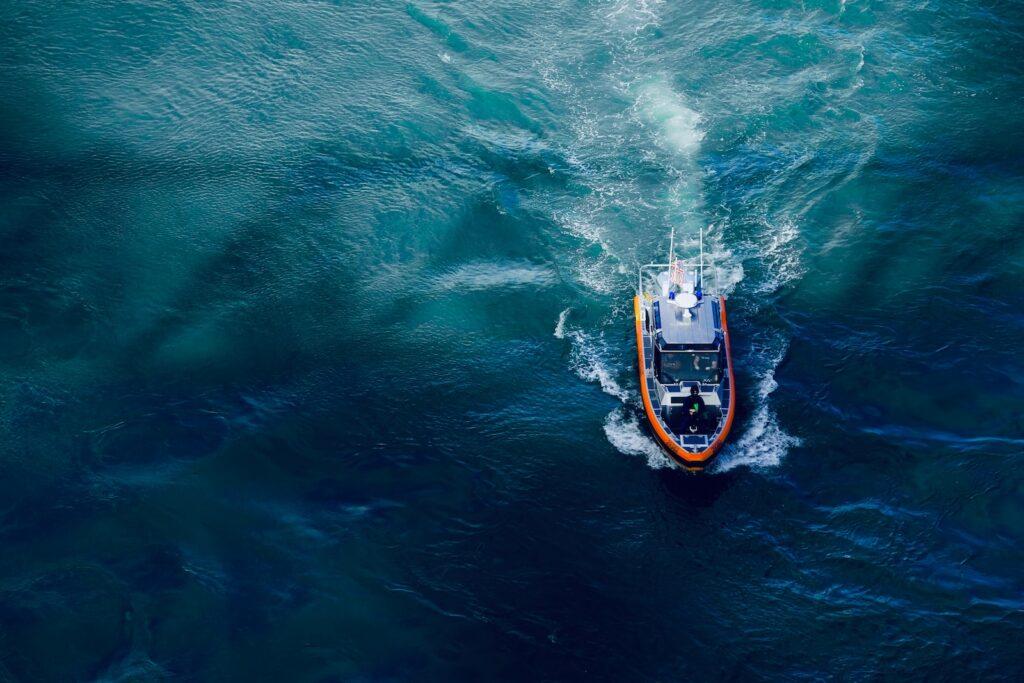Best Marine Epoxies
Epoxy is an essential product for boat owners, both amateur and professional. Marine epoxy is a special type of epoxy that is designed to hold up to the harsh elements of the ocean and other marine environments. Not all epoxy products are designed for use in marine applications and it is important to select the best marine epoxy for your boat.
Best Marine Epoxies
The best marine epoxies are those that are specifically designed for use on boats and other marine vessels. They should be made to be waterproof, durable, and resistant to salt water and other harsh elements. They should also be easy to use and provide a strong bond that won’t break down over time. Be sure to read the instructions carefully and follow them closely when applying the epoxy.
WEST SYSTEM 105 Epoxy Resin: This epoxy resin is known for its high strength and versatility. It can be used for a wide range of applications, including fiberglass repair, bonding, and coating. It has excellent adhesive properties and is resistant to moisture and chemicals.
TotalBoat ThickSet Clear Casting Epoxy: This marine epoxy is specifically designed for casting and encapsulating applications. It cures to a crystal-clear finish and is ideal for creating decorative pieces, jewelry, and encapsulating items on boats. It has a low viscosity and is easy to mix and pour.
MAS Epoxies FLAG Resin System: This epoxy resin system is popular among boat builders and repair professionals. It offers excellent bonding strength and impact resistance. It can be used for laminating, coating, and bonding applications. It is also compatible with a variety of fillers and additives for customizing the epoxy properties.
System Three Clear Coat Epoxy: This marine epoxy is specifically formulated for coating and sealing applications. It provides a durable, clear finish that enhances the natural beauty of wood and other substrates. It is UV-resistant and offers excellent moisture protection.
J‑B Weld MarineWeld Epoxy: This epoxy adhesive is designed for marine repairs and bonding applications. It is water-resistant and can be used on a variety of surfaces, including metal, wood, and fiberglass. It sets in 4–6 hours and can be sanded, drilled, and painted after curing.
It’s important to choose the right type of marine epoxy for the job, as different types are better suited to different types of repair work. For example, polyester epoxy is great for patching and filling small holes, while polyurethane epoxy is better for larger repairs. Some epoxies are designed to be used in specific areas, such as underwater or in direct sunlight, so be sure to check for any special instructions before making a purchase.

What is Marine Epoxy?
Marine epoxy is a highly durable and waterproof epoxy resin designed specifically for use in marine environments. It is usually reinforced with various fillers, such as fiberglass, carbon fiber, Kevlar, or other composites to make it even stronger and more resistant to harsh elements. Marine epoxy is designed to withstand the corrosive effects of salt water and is formulated to bond to a variety of surfaces, including wood, metal, fiberglass, and plastic.
It is a two-part adhesive made from a resin and a hardener that is used to form a strong and waterproof bond on materials exposed to water. It is typically used to seal, bond, and repair materials such as wood, metal, fiberglass, and plastic that are used in marine environments. Marine epoxy is often considered to be the most reliable and durable adhesive for use in wet and salty environments.
Benefits of Marine Epoxy
There are many benefits to using marine epoxy on your boat. It is extremely durable, waterproof, and resistant to corrosion. It can be used to bond a variety of materials, including wood and metal, and it can also be used as a sealant for aluminum boats and seams. Marine epoxy is also highly resistant to UV rays, making it ideal for use on the deck or hull of your boat.
Superior Strength and Durability: Marine epoxy is known for its exceptional strength and durability. It forms a strong bond that can withstand the harsh marine environment, including exposure to water, chemicals, and UV rays. It provides long-lasting protection to the boat structure and components.
Water and Moisture Resistance: One of the key advantages of marine epoxy is its resistance to water and moisture. It creates a waterproof barrier that prevents water infiltration, minimizing the risk of rot, decay, and damage caused by moisture. This is particularly important for applications such as fiberglass repair, hull reinforcement, and sealing boat surfaces.
Versatility: Marine epoxy is a versatile material that can be used for various boat-related tasks. It can be used for bonding, laminating, coating, filling, and repairing different materials, including fiberglass, wood, metal, and composite materials. It provides a strong and reliable bond, ensuring the structural integrity of the boat.
Chemical and Corrosion Resistance: Marine epoxy is highly resistant to chemicals, fuels, and other substances commonly found in the marine environment. This makes it suitable for applications where exposure to harsh chemicals or corrosive substances is expected, such as fuel tank repairs or bonding metal components.
Easy Application and Workability: Marine epoxy is typically easy to mix and apply, allowing for precise application and coverage. It can be applied with brushes, rollers, or sprayers, depending on the specific task. It has a suitable working time and can be shaped or sanded as needed before it cures.
Aesthetics and Finish: Many marine epoxy products are designed to provide a smooth, clear, or glossy finish that enhances the aesthetics of the boat. This is particularly desirable for applications where the epoxy will be visible, such as coating wooden surfaces or creating decorative elements.
Long-Term Cost Savings: While marine epoxy may have a higher upfront cost compared to other adhesive or sealing options, its long-term durability and resistance to degradation can result in cost savings over time. By providing reliable protection and minimizing the need for frequent repairs or replacements, marine epoxy can help extend the lifespan of boat components and structures.
Marine epoxy is a type of adhesive that is used to bond materials together in marine applications. It is highly resistant to water and salt, making it ideal for use in marine environments. Marine epoxy also offers superior strength and durability compared to other adhesives. It is heat and chemical resistant, making it suitable for use in a variety of situations.
What is the best epoxy for boatbuilding?
The best epoxy for boatbuilding depends on the specific application and materials involved, as well as environmental conditions. Generally speaking, epoxy resins, such as WEST SYSTEM 105/206, are preferred for boatbuilding as they are strong, durable, and waterproof. They are also able to withstand the marine environment, including UV rays, saltwater, and weathering. Additionally, epoxy is easy to use and can be used with various materials, making it ideal for boatbuilding.
When selecting an epoxy for boatbuilding, it is important to consider the particular application, as some epoxies are better for bonding materials together, while others are better for coating and sealing. The curing time of the epoxy should also be taken into consideration, as this determines when the boat can be launched or used in the water. It is also important to use a two-part epoxy system, with a resin and hardener, in order to ensure a strong bond and lasting protection. The temperature of the environment should also be taken into account when selecting the best epoxy for the job.

Types of Marine Epoxy
There are several different types of marine epoxy available on the market today. The most common types are two-part epoxy and one-part epoxy. Two-part epoxies require the mixing of two components before they can be used, while one-part epoxies can simply be applied without mixing.
Two-Part Epoxy
Two-part epoxy is more durable than one-part epoxy and usually has a longer shelf-life. It is also more expensive, but it is worth the extra cost due to its superior durability and strength. The two components must be mixed together in the correct ratio for the epoxy to work properly.
One-Part Epoxy
One-part epoxy is a ready-to-use product that does not require mixing. It is often less expensive than two-part epoxy and is easier to use. However, one-part epoxy is not as durable or as strong as two-part epoxy and has a shorter shelf-life.
Polyester Resin
Polyester resin is a type of epoxy that is often used in boat repairs and maintenance. It is very strong and durable and is designed to bond to a variety of surfaces. Polyester resin is usually used in combination with fiberglass cloth to create a strong bond between two surfaces.
Polyurethane Resin
Polyurethane resin is another type of epoxy that is commonly used for boat repairs and maintenance. It is stronger and more durable than polyester resin, but it is also more expensive. Polyurethane resin is usually used in combination with fiberglass cloth to create a strong bond between two surfaces.
How to Select the Best Marine Epoxy

When selecting a marine epoxy, it is important to consider the type of application you need it for. If you are using it for a structural application, such as bonding two surfaces together, you should opt for a two-part epoxy. If you are using it as a sealant or coating, then a one-part epoxy will likely be sufficient. It is also important to consider the type of material you are working with, as different epoxies are better suited for different materials.
The most important factor to consider is the type of situation the epoxy will be used for. Different types of marine epoxy are designed for different purposes, such as repair, bonding, and sealing. It is important to consider the environment in which the epoxy will be used. For example, if the epoxy will be exposed to salt water, it is important to make sure the epoxy is specifically formulated to be resistant to salt. It is also important to make sure the epoxy is compatible with the surface it will be applied to.
Tips for Using Marine Epoxy
When working with marine epoxy, it is important to follow the manufacturer’s instructions carefully. It is also important to wear protective clothing, such as gloves and eyewear, to avoid contact with the epoxy. Additionally, make sure the surface you are applying the epoxy to is clean and free of debris, as this can affect the adhesion of the epoxy.
Safety Precautions
When working with marine epoxy, it is important to take safety precautions. Epoxy is a powerful adhesive, and contact with the skin or eyes can cause irritation or burns. Make sure to wear protective clothing, such as gloves and eyewear, when handling epoxy. Additionally, make sure to work in a well-ventilated area, as the fumes from epoxy can be hazardous.
Storage
Make sure to store marine epoxy in a cool, dry place. Extreme temperatures, such as hot or cold, can reduce the shelf-life of the epoxy and cause it to become less effective. Additionally, make sure to check the expiration date on the container to ensure you are using a fresh product.
Cleanup
When working with epoxy, it is important to clean up any spills or excess epoxy immediately. Most epoxies are solvent-based and can be cleaned up with denatured alcohol or paint thinner. Make sure to dispose of any unused epoxy or cleaning products in accordance with local regulations.
Safety Disclaimer
It is important to read the product label and follow all safety instructions when using marine epoxy. If you are unsure of how to use the product, consult the manufacturer or a professional for further guidance. Additionally, make sure to wear appropriate safety gear and to work in a well-ventilated area.
Conclusion
Marine epoxy is an essential product for boat owners and is designed to hold up to the harsh elements of the ocean and other marine environments. There are several different types of marine epoxy available, including two-part epoxy, one-part epoxy, polyester resin, and polyurethane resin. When selecting a marine epoxy, it is important to consider the type of application you need it for, as well as the type of material you are working with. It is also important to follow the manufacturer’s instructions carefully when using marine epoxy and to wear protective clothing to avoid contact with the epoxy.
What is the best marine epoxy for repairing fiberglass hulls?
When it comes to repairing fiberglass hulls, many boaters recommend the XYZ Marine Epoxy. It offers excellent adhesion to fiberglass surfaces, provides a strong bond, and is highly resistant to water and UV rays. Its versatility and durability make it a top choice for boat owners looking to repair or reinforce their fiberglass hulls.
Which marine epoxy is best for sealing wooden boat decks?
The ABC Marine Epoxy is highly regarded for sealing wooden boat decks. It offers superior moisture resistance, prevents rot and decay, and provides a durable protective layer. Its easy application and excellent adhesion to wood make it an ideal choice for maintaining and protecting wooden boat decks.
What is the best marine epoxy for bonding metal components?
The DEF Marine Epoxy is widely recommended for bonding metal components in boats. It offers exceptional adhesion to various metals, including aluminum and stainless steel. Its high strength and corrosion resistance make it suitable for applications such as bonding metal brackets, supports, and fittings.
